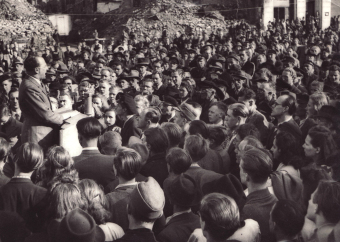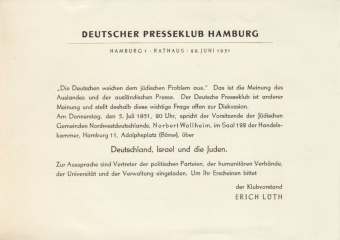Public Appearances and Journalistic Work of Norbert Wollheim (1945–1951)

© United States Holocaust Memorial Museum (Wollheim papers, photo: Karl Stockhaus, Bremen)

Q: That was an attitude you found south Germany, west Germany, mid Germany?
NW: Everywhere. They didn’t know about it and they had suffered so much. They also suffered so much. But certainly they were all resistance fighters.”
(Norbert Wollheim, Interview with Nikolaus Creutzfeldt [Eng.], New York 1986–88 (Heinlyn Productions; produced by Leslie C. Wolf). Archive of the Fritz Bauer Institute, transcript, p. 170.)
(“Taking Stock, Six Years Later.” Norbert Wollheim's address at the Berlin conference of the Central Council. In: Allgemeine Wochenzeitung der Juden in Deutschland, September 7, 1951. (Transl. KL))
“The persecutor does not have the right simultaneously to forgive. That can be done by no one but the victim, that is, by us.”[1]
In the years 1945–1951, Norbert Wollheim not only was active as deputy chairman of the Central Committee of Liberated Jews in the British Zone in work for Displaced Persons (DPs) and as chairman of the Jewish Communities in the British Zone in the rebuilding of Jewish community life in Germany, but also made frequent appearances as a public speaker and in the media, in newspaper articles.
On days of remembrance for the crimes of National Socialism, Wollheim gave speeches in Hamburg, the hub of the British zone, including, for example, one on April 1, 1948, the anniversary of the boycott of Jewish businesses by the Nazis on April 1, 1933. It was broadcast by the Nordwestdeutscher Rundfunk in Hamburg and printed on the first page of the Jüdisches Gemeindeblatt on April 14, 1948. On November 9, 1948, again in Hamburg, Wollheim spoke on the anniversary of the pogrom on November 9 and 10, 1938; the text of this speech was published by Unzer Sztyme at the Bergen-Belsen DP camp. When the memorial of the Jewish community of Hamburg was dedicated at the Ohlsdorf cemetery on June 24, 1951, Wollheim spoke there as a representative of the Central Council of Jews in Germany.
It was important to Norbert Wollheim that the Nazis’ crimes not go unpunished; in his official functions he worked closely with the British occupation authorities in Hamburg on investigations of Nazi criminals. He also engaged in public advocacy, urging that the Nazis’ crimes not be kept secret and not be downplayed. He especially wished to emphasize that these crimes had been committed first and foremost against Jews. Thus he opposed the Mayor of Kiel, Andreas Gayk, who spoke only in nonspecific terms at a memorial event on September 1, 1948, referring to the “immeasurable suffering” and the fallen soldiers, those who died in the homeland, and the “pain-racked creature of all countries.”[2] Wollheim criticized the “active keeping silent about Jews” that was prevalent in this type of “commemorative address.”[3] Consequently Wollheim testified both in the I.G. Farben trial at Nuremberg and in the Harlan trial, but he appeared disappointed by the administration of justice, as he made clear in the Allgemeine Wochenzeitung der Juden in Deutschland on June 17, 1949. For the Harlan trial, he had even helped collect materials about the Nazi film director and his anti-Semitic film Jud Süß (Germany, 1940).[4] The stance of many Germans in the postwar period, their repeatedly and clearly manifested anti-Semitism, their self-perception as “victims,”
In the years 1948/1949, Norbert Wollheim regularly published prominently placed articles in the Jüdisches Gemeindeblatt / Allgemeine Wochenzeitung der Juden in Deutschland, frequently either the lead story or an op-ed column on the front page. These writings have three core themes: First, work in the Jewish organizations; here Wollheim’s articles do not report, but follow a program, as clearly seen in his article on June 23, 1948, about the World Jewish Congress in view of its second congress in Montreux a few days later, and in his remarks on the organization of Jewish life in Germany in light of the founding of the FRG, headed “Wo stehen wir?” (Where do we stand?) and appearing on July 29, 1949. This first category also includes articles about members of the Central Committee of Liberated Jews in the British Zone who were emigrating from Germany (March 11, 1949, June 17. 1949), and an appreciation of Leo Baeck on his seventy-fifth birthday (May 22, 1948). Second, Wollheim again and again returns to the theme of the undiminished German anti-Semitism and nationalism that confronted the DPs; two of these articles appeared as lead stories, headlined “Nun singen sie wieder…” (Now they’re singing again...) (March 18, 1949) and “Hat Hitler doch gesiegt?” (Did Hitler win after all?) (26. August 1949). Third, in several texts in 1948 and 1949, Norbert Wollheim takes an interest in the development of the state of Israel (September 24, 1948, May 13, 1949). This category also includes a lecture on the history of Zionism up through the founding of the state of Israel (February 25, 1949), broadcast by the Nordwestdeutscher Rundfunk on February 20, 1949. Wollheim directs special attention to the way the international community is receiving the new state (December 31, 1948, January 28, 1949); a positive highlight here is the admission of Israel to the United Nations “Das 59. Mitglied” (The fifty-ninth member) (May 20, 1949). Only two weeks previously, he had published impressions from his first trip to Israel here: “Ich sah Israel” (I saw Israel) (May 6, 1949). In 1947/48, Wollheim also published several short articles and letters to the editor in Aufbau.
Wollheim continued to be in the public eye up to the time just before his emigration to the United States in September 1951. He gave a talk in Düsseldorf on January 17, 1951, saying that there were no longer any Jewish Germans or German Jews in Germany, but “only Jews in Germany,”[5] and thus intervened in debates about the future of Jewish life in Germany. This speech was reported on at length in the Allgemeine Wochenzeitung der Juden in Deutschland on January 26, 1951. At the same time Wollheim supported Erich Lüth, the press spokesman for the Free and Hanseatic City of Hamburg, in his “Peace with Israel” campaign, which was announced on August 31, 1951, on the Nordwestdeutscher Rundfunk in a radio discussion in which Norbert Wollheim participated. On July 5, 1951, Wollheim had spoken at Erich Lüth’s invitation at the Deutscher Presseclub Hamburg about “Germany, Israel, and the Jews”; the idea for Lüth’s campaign came in response to this talk.
(MN; transl. KL)
















